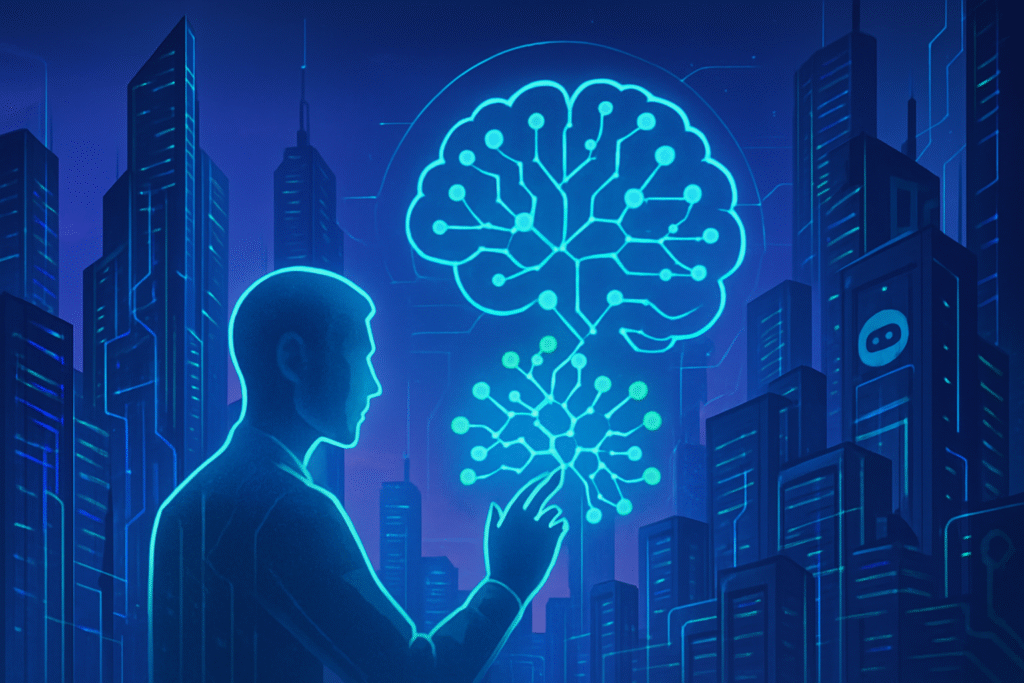
The landscape of the global tech industry is undergoing a profound and rapid transformation, driven by the accelerating integration of Artificial Intelligence. Recent surveys and reports from 2024-2025 paint a clear picture: AI is not merely enhancing existing roles but is fundamentally redefining the tech workforce, leading to a significant wave of job reassignments and, in many instances, outright layoffs. This immediate shift signals an urgent need for adaptation from both individual workers and organizations, as the industry grapples with the dual forces of automation and the creation of entirely new, specialized opportunities.
In the first half of 2025 alone, the tech sector saw over 89,000 job cuts, adding to the 240,000 tech layoffs recorded in 2024, with AI frequently cited by major players like Microsoft (NASDAQ: MSFT), Google (NASDAQ: GOOGL), Intel (NASDAQ: INTC), Amazon (NASDAQ: AMZN), and Meta (NASDAQ: META) as a contributing factor. While some of these reductions are framed as "right-sizing" post-pandemic, the underlying current is the growing efficiency enabled by AI automation. This has led to a drastic decline in entry-level positions, with junior roles in various departments experiencing significant drops in hiring rates, challenging traditional career entry points. However, this is not solely a narrative of job elimination; experts describe it as a "talent remix," where companies are simultaneously cutting specific positions and creating new ones that leverage emerging AI technologies, demanding a redefinition of essential human roles.
The Technical Underpinnings of Workforce Evolution: Generative AI and Beyond
The current wave of workforce transformation is directly attributable to significant technical advancements in AI, particularly generative AI, sophisticated automation platforms, and multi-agent systems. These capabilities represent a new paradigm, vastly different from previous automation technologies, and pose unique technical implications for enterprise operations.
Generative AI, encompassing large language models (LLMs), is at the forefront. These systems can generate new content such as text, code, images, and even video. Technically, generative AI excels at tasks like code generation and error detection, reducing the need for extensive manual coding, particularly for junior developers. It's increasingly deployed in customer service for advanced chatbots, in marketing for content creation, and in sales for building AI-powered units. More than half of the skills within technology roles are expected to undergo deep transformation due to generative AI, prompting companies like Dell (NYSE: DELL), IBM (NYSE: IBM), Microsoft, Google, and SAP (NYSE: SAP) to link workforce restructuring to their pivot towards integrating this technology.
Intelligent Automation Platforms, an evolution of Robotic Process Automation (RPA) integrated with AI (like machine learning and natural language processing), are also driving change. These platforms automate repetitive, rules-based, and data-intensive tasks across administrative functions, data entry, and transaction processing. AI assistants, merging generative AI with automation, can intelligently interact with users, support decision-making, and streamline or replace entire workflows. This reduces the need for manual labor in areas like manufacturing and administrative roles, leading to reassignments or layoffs for fully automatable positions.
Perhaps the most advanced are Multi-Agent Systems, sophisticated AI frameworks where multiple specialized AI agents collaborate to achieve complex goals, often forming an "agent workforce." These systems can decompose complex problems, assign subtasks to specialized agents, and even replace entire call centers by handling customer requests across multiple platforms. In software development, agents can plan, code, test, and debug applications collaboratively. These systems redefine traditional job roles by enabling "AI-first teams" that can manage complex projects, potentially replacing multiple human roles in areas like marketing, design, and project management.
Unlike earlier automation, which primarily replaced physical tasks, modern AI automates cognitive, intellectual, and creative functions. Current AI systems learn, adapt, and continuously improve without explicit reprogramming, tackling problems of unprecedented complexity by coordinating multiple agents. While previous technological shifts took decades to materialize, the adoption and influence of generative AI are occurring at an accelerated pace. Technically, this demands robust infrastructure, advanced data management, complex integration with legacy systems, stringent security and ethical governance, and a significant upskilling of the IT workforce. AI is revolutionizing IT operations by automating routine tasks, allowing IT teams to focus on strategic design and innovation.
Corporate Maneuvers: Navigating the AI-Driven Competitive Landscape
The AI-driven transformation of the tech workforce is fundamentally altering the competitive landscape, compelling AI companies, major tech giants, and startups to strategically adapt their market positioning and operational models.
Major Tech Giants like Amazon, Apple (NASDAQ: AAPL), Meta, IBM, Microsoft, and Google are undergoing significant internal restructuring. While experiencing layoffs, often attributed to AI-driven efficiency gains, these companies are simultaneously making massive investments in AI research and development. Their strategy involves integrating AI into core products and services to enhance efficiency, maintain a competitive edge, and "massively upskill" their existing workforce for human-AI collaboration. For instance, Google has automated tasks in sales and customer service, shifting human efforts towards core AI research and cloud services. IBM notably laid off thousands in HR as its chatbot, AskHR, began handling millions of internal queries annually.
AI Companies are direct beneficiaries of this shift, thriving on the surging demand for AI technologies and solutions. They are the primary creators of new AI-related job opportunities, actively seeking highly skilled AI specialists. Companies deeply invested in AI infrastructure and data collection, such as Palantir Technologies (NYSE: PLTR) and Broadcom Inc. (NASDAQ: AVGO), have seen substantial growth driven by their leadership in AI.
Startups face a dual reality. AI provides immense opportunities for increased efficiency, improved decision-making, and cost reduction, enabling them to compete against larger players. Companies like DataRobot and UiPath (NYSE: PATH) offer platforms that automate machine learning model deployment and repetitive tasks, respectively. However, startups often contend with limited resources, a lack of in-house expertise, and intense competition for highly skilled AI talent. Companies explicitly benefiting from leveraging AI for efficiency and cost reduction include Klarna, Intuit (NASDAQ: INTU), UPS (NYSE: UPS), Duolingo (NASDAQ: DUOL), and Fiverr (NYSE: FVRR). Klarna, for example, replaced the workload equivalent of 700 full-time staff with an AI assistant.
The competitive implications are profound: AI enables substantial efficiency and productivity gains, leading to faster innovation cycles and significant cost savings. This creates a strong competitive advantage for early adopters, with organizations mastering strategic AI integration achieving 15-25% productivity gains. The intensified race for AI-native talent is another critical factor, with a severe shortage of AI-critical skills. Companies failing to invest in reskilling risk falling behind. AI is not just optimizing existing services but enabling entirely new products and business models, transforming traditional workflows. Strategic adaptation involves massive investment in reskilling and upskilling programs, redefining roles for human-AI collaboration, dynamic workforce planning, fostering a culture of experimentation, integrating AI into core business strategy, and a shift towards "precision hiring" for AI-native talent.
Broader Implications: Navigating the Societal and Ethical Crossroads
The widespread integration of AI into the workforce carries significant wider implications, fitting into broader AI landscape trends while raising critical societal and ethical concerns, and drawing comparisons to previous technological shifts.
AI-driven workforce changes are leading to societal impacts such as job insecurity, as AI displaces routine and increasingly complex cognitive jobs. While new roles emerge, the transition challenges displaced workers lacking advanced skills. Countries like Singapore are proactively investing in upskilling. Beyond employment, there are concerns about psychological well-being, potential for social instability, and a growing wage gap between "AI-enabled" workers and lower-paid workers, further polarizing the workplace.
Potential concerns revolve heavily around ethics and economic inequality. Ethically, AI systems trained on historical data can perpetuate or amplify existing biases, leading to discrimination in areas like recruitment, finance, and healthcare. Increased workplace surveillance and privacy concerns arise from AI tools collecting sensitive personal data. The "black box" nature of many AI models poses challenges for transparency and accountability, potentially leading to unfair treatment. Economically, AI-driven productivity gains could exacerbate wealth concentration, widening the wealth gap and deepening socio-economic divides. Labor market polarization, with demand for high-paying AI-centric jobs and low-paying non-automatable jobs, risks shrinking the middle class, disproportionately affecting vulnerable populations. The lack of access to AI training for displaced workers creates significant barriers to new opportunities.
Comparing AI's workforce transformation to previous major technological shifts reveals both parallels and distinctions. While the Industrial Revolution mechanized physical labor, AI augments and replaces cognitive tasks, fundamentally changing how we think and make decisions. Unlike the internet or mobile revolutions, which enhanced communication, AI builds upon this infrastructure by automating processes and deriving insights at an unprecedented scale. Some experts argue the pace of AI-driven change is significantly faster and more exponential than previous shifts, leaving less time for adaptation, though others suggest a more gradual evolution.
Compared to previous AI milestones, the current phase, especially with generative AI, is deeply integrated across job sectors, driving significant productivity boosts and impacting white-collar jobs previously immune to automation. Early AI largely focused on augmenting human capabilities; now, there's a clear trend toward AI directly replacing certain job functions, particularly in HR, customer support, and junior-level tech roles. This shift from "enhancing human capabilities" to "replacing jobs" marks a significant evolution. The current AI landscape demands higher-level skills, including AI development, data science, and critical human capabilities like leadership, problem-solving, and empathy that AI cannot replicate.
The Horizon: Future Developments and Expert Predictions
Looking ahead, the impact of AI on the tech workforce is poised for continuous evolution, marked by both near-term disruptions and long-term transformations in job roles, skill demands, and organizational structures. Experts largely predict a future defined by pervasive human-AI collaboration, enhanced productivity, and an ongoing imperative for adaptation and continuous learning.
In the near-term (1-5 years), routine and manual tasks will continue to be automated, placing entry-level positions in software engineering, manual QA testing, basic data analysis, and Tier 1/2 IT support at higher risk. Generative AI is already proving capable of writing significant portions of code previously handled by junior developers and automating customer service. However, this period will also see robust tech hiring driven by the demand for individuals to build, implement, and manage AI systems. A significant percentage of tech talent will be reassigned, necessitating urgent upskilling, with 60% of employees expected to require retraining by 2027.
The long-term (beyond 5 years) outlook suggests AI will fundamentally transform the global workforce by 2050, requiring significant adaptation for up to 60% of current jobs. While some predict net job losses by 2027, others forecast a net gain of millions of new jobs by 2030, emphasizing AI's role in rewiring job requirements rather than outright replacement. The vision is "human-centric AI," augmenting human intelligence and reshaping professions to be more efficient and meaningful. Organizations are expected to become flatter and more agile, with AI handling data processing, routine decision-making, and strategic forecasting, potentially reducing middle management layers. The emergence of "AI agents" could double the knowledge workforce by autonomously performing complex tasks.
Future job roles will include highly secure positions like AI/Machine Learning Engineers, Data Scientists, AI Ethicists, Prompt Engineers, and Cloud AI Architects. Roles focused on human-AI collaboration, managing and optimizing AI systems, and cybersecurity will also be critical. In-demand skills will encompass technical AI and data science (Python, ML, NLP, deep learning, cloud AI), alongside crucial soft skills like critical thinking, creativity, emotional intelligence, adaptability, and ethical reasoning. Data literacy and AI fluency will be essential across all industries.
Organizational structures will flatten, becoming more agile and decentralized. Hybrid teams, where human intelligence and AI work hand-in-hand, will become the norm. AI will break down information silos, fostering data transparency and enabling data-driven decision-making at all levels. Potential applications are vast, ranging from automating inventory management and enhancing productivity to personalized customer experiences, advanced analytics, improved customer service via chatbots, AI-assisted software development, and robust cybersecurity.
However, emerging challenges include ongoing job displacement, widening skill gaps (with many employees feeling undertrained in AI), ethical dilemmas (privacy, bias, accountability), data security concerns, and the complexities of regulatory compliance. Economic inequalities could be exacerbated if access to AI education and tools is not broadly distributed.
Expert predictions largely converge on a future of pervasive human-AI collaboration, where AI augments human capabilities, allowing humans to focus on tasks requiring uniquely human skills. Human judgment, autonomy, and control will remain paramount. The focus will be on redesigning roles and workflows to create productive partnerships, making lifelong learning an imperative. While job displacement will occur, many experts predict a net creation of jobs, albeit with a significant transitional period. Ethical responsibility in designing and implementing AI systems will be crucial for workers.
A New Era: Summarizing AI's Transformative Impact
The integration of Artificial Intelligence into the tech workforce marks a pivotal moment in AI history, ushering in an era of profound transformation that is both disruptive and rich with opportunity. The key takeaway is a dual narrative: while AI automates routine tasks and displaces certain jobs, it simultaneously creates new, specialized roles and significantly enhances productivity. This "talent remix" is not merely a trend but a fundamental restructuring of how work is performed and valued.
This phase of AI adoption, particularly with generative AI, is akin to a general-purpose technology like electricity or the internet, signifying its widespread applicability and potential as a long-term economic growth driver. Unlike previous automation waves, the speed and scale of AI's current impact are unprecedented, affecting white-collar and cognitive roles previously thought immune. While initial fears of mass unemployment persist, the consensus among many experts points to a net gain in jobs globally, albeit with a significant transitional period demanding a drastic change in required skills.
The long-term impact will be a continuous evolution of job roles, with tasks shifting towards those requiring uniquely human skills such as creativity, critical thinking, emotional intelligence, and strategic thinking. AI is poised to significantly raise labor productivity, fostering new business models and improved cost structures. However, the criticality of reskilling and lifelong learning cannot be overstated; individuals and organizations must proactively invest in skill development to remain competitive. Addressing ethical dilemmas, such as algorithmic bias and data privacy, and mitigating the risk of widening economic inequality through equitable access to AI education and tools, will be paramount for ensuring a beneficial and inclusive future.
What to watch for in the coming weeks and months: Expect an accelerated adoption and deeper integration of AI across enterprises, moving beyond experimentation to full business transformation with AI-native processes. Ongoing tech workforce adjustments, including layoffs in certain roles (especially entry-level and middle management) alongside intensified hiring for specialized AI and machine learning professionals, will continue. Investment in AI infrastructure will surge, creating construction jobs in the short term. The emphasis on AI fluency and human-centric skills will grow, with employers prioritizing candidates demonstrating both. The development and implementation of comprehensive reskilling programs by companies and educational institutions, alongside policy discussions around AI's impact on employment and worker protections, will gain momentum. Finally, continuous monitoring and research into AI's actual job impact will be crucial to understand the true pace and scale of this ongoing technological revolution.
This content is intended for informational purposes only and represents analysis of current AI developments.
TokenRing AI delivers enterprise-grade solutions for multi-agent AI workflow orchestration, AI-powered development tools, and seamless remote collaboration platforms. For more information, visit https://www.tokenring.ai/.





